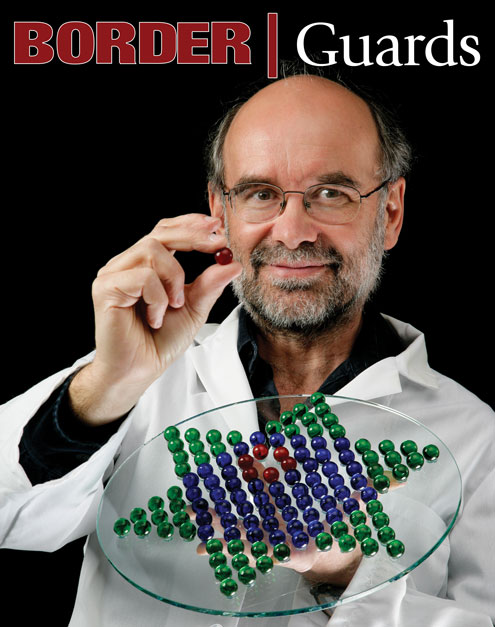|
|
|
 |
|---|
“[The initiative] will consolidate human disease, veterinary disease and plant disease with the idea that they are all inextricably linked to human health in one way or another,” McFadden says.
It’s undoubtedly an ambitious agenda. And Richard Moyer, UF’s senior associate dean for research development and fellow poxvirus researcher, couldn’t be happier to have McFadden joining the team.
As an unwavering proponent of an emerging pathogens initiative, Moyer has had his eye on McFadden for 10 years. It was only last year, as the initiative was taking shape on paper, that he saw an opportunity to tap McFadden’s strength inside and outside the lab.
“I think Grant is one of the most gifted scientists working in the field of host-pathogen interactions,” Moyer says. “But he has also shown how a typical scientist can take discoveries into the marketplace and I think that experience will be very valuable for the initiative.”
In 1997, McFadden and his partner of nearly 30 years, cardiologist and vascular biologist Alexandra Lucas, founded Viron Therapeutics. A clinical biopharmaceutical company, Viron is the first company in the world to develop viral proteins as potent anti-inflammatory drugs. Last year, the company earned the prestigious Prix Galien, considered the Nobel Prize of the pharmaceutical and biotechnology industry, and began a Phase II clinical trial of its lead compound for the treatment of acute coronary syndromes.
For McFadden, Viron’s continued success has been a fortuitous addition to a fundamental research career that has shed significant light on how viruses are able to disarm their unwitting hosts. Moving south to take on a challenging new role was the last thing on his mind when Moyer came a-calling.
“My first thoughts were I’m happy where I am now and I’m too busy to worry about other options,” recalls McFadden, who has held a Canada Research Chair in Molecular Virology and co-directed the BioTherapeutics Research Group at Robarts Research Institute in London, Ontario, for most of the last 10 years. In 2005, he was one of a select group of investigators from 20 countries funded as international research scholars by the prestigious Howard Hughes Medical Institute.
“When I came down to Gainesville I met some of the people involved in this initiative and they helped me realize that no institution elsewhere in the world was even remotely close in terms of the planning and the seriousness of the commitment to the subject of emerging diseases, a subject dear to my heart for many years.”
That commitment to research has since been reinforced by $26 million in state funding to begin construction of a facility and to hire more top researchers.
While the idea of an emerging pathogens initiative pre-dated the 2001 terrorist attacks, McFadden acknowledges that government leaders are more sensitized, and perhaps more receptive, to the case for the fundamental investigation of infectious disease.
“The reality, however, is that the greatest bioterrorist is Mother Nature herself, in that viruses and other pathogens have evolved excellent strategies to breach our immune systems,” McFadden says. “The real subject of the initiative will be how Mother Nature works herself.”
What fascinates McFadden — his eyes flash with intensity when the conversation turns to science — is looking for precise molecular keys to unlock the fundamental secrets that nature has held for millennia.
Coiled into our DNA and conserved across species are the blueprints for metabolic pathways and biochemical messenger systems that keep us in good physiologic stead: allowing the cellular repair, growth and replication needed to build and repair the various tissues of the body throughout our lives.
Viruses and other pathogens deploy a range of potent molecules in an attempt to disrupt and hijack those systems for the sole purpose of making more copies of themselves, host be damned. The essential concept at work, the one that has captivated McFadden’s interest so thoroughly over the years, is what is referred to as permissiveness.
When a pathogen leaps species — such as HIV from monkey to man — it’s usually because it has been able to circumvent or subvert the host’s cellular pathways, finely tuned chains of molecular activity that act as barriers to foreign invaders. Scientists are still developing a basic understanding of these pathways — which molecules trigger which metabolic reactions — but there is evidence of some common evolutionary elements between animals and humans, even between plants and humans.
In many ways, those innate pathways underlie the ultimate goal of the Emerging Pathogens Initiative: to discover common elements at work in order to better understand how pathogens successfully cross into new species.
Working in that immunological border zone, McFadden is a prolific investigator. He has published more than 200 scientific papers and earned two dozen awards. He has advised agencies around the world, from the National Institutes of Health to the government of Australia on issues as diverse as bioterrorism and biological controls on animal populations.
Last year in the journal Immunity, McFadden described how a particular viral protein blocks a cell’s ability to launch an immune attack by infiltrating a structure called the inflammasome, which is involved in triggering inflammatory responses. In the absence of inflammasome response, the virus lives on unmolested, replicating freely. Understanding this mechanism points toward targets for new drugs to counteract this viral invasion.
“It’s a very interesting new strategy and that discovery alone would probably run my lab for many years,” McFadden notes matter-of-factly. But there are other promising avenues he hopes to explore, particularly in the field of oncolytic or cancer-fighting viruses.
In 2005, McFadden showed, in collaboration with Peter Forsyth of the University of Calgary, that myxoma, a poxvirus of rabbits, is able to cross the species border and replicate in certain human cancer cells, killing brain tumors in mice but not harming adjacent healthy cells.
McFadden’s lab is only now beginning to get “whiffs” of the factors that determine whether a virus will be allowed into a given mammalian cell or cancer cell. One of the biochemical pathways that myxoma exploits when entering a host cell is called the AKT signaling pathway, which, when activated, promotes cell survival. This finding is important because AKT signaling is the most frequently modified pathway in human cancer, suggesting that myxoma could prove a powerful weapon in the cancer-fighting arsenal.
“The fact that the (myxoma) virus specifically monitors and harvests this pathway tells us that there is something about this pathway that is critical to the virus — that will allow the virus to be permissive in cancer cells. We have our first hint of what the cell is providing but we don’t yet understand the mechanics of what the virus is actually doing with that pathway. So that’s one of the things we’re hoping to study in the future.”
Needless to say, challenging times lie ahead for McFadden, but it’s all part of what he sees as an opportunity to share and build on his scientific passion. And it’s a move that works for his whole family.
Lucas, whose own research interest lies in anti-inflammatory strategies to treat atherosclerosis or hardening of the arteries, was recruited concurrently to the UF College of Medicine’s Ethel Smith Research Professorship.
Both Lucas and McFadden knew it was a once-in-a-lifetime opportunity.
“The kids have traveled extensively with us over the years and are certainly open to new experiences. In fact, Seana (the couple’s 23-year-old daughter) and Alex are just back in Haiti,” McFadden says, noting that Lucas has been visiting the impoverished island nation over the last few years to provide medical care to thousands during a non-stop week at a community clinic. “Between all of us we’re pretty much unfazed by borders.”
Seana, who grew up in Edmonton, Alberta, and London, Ontario, is an aspiring actor now living in Vancouver, British Columbia; the couple’s 20-year-old son Baron is an undergraduate science student in Waterloo, Ontario, hoping to transfer to UF; and 13-year-old Matthew will be going to high school in Gainesville.
“What was the deal clincher? Two things: Alex’s happiness with her position and my conviction that the University of Florida was making a commitment to a subject that has long fascinated me,” says McFadden.
